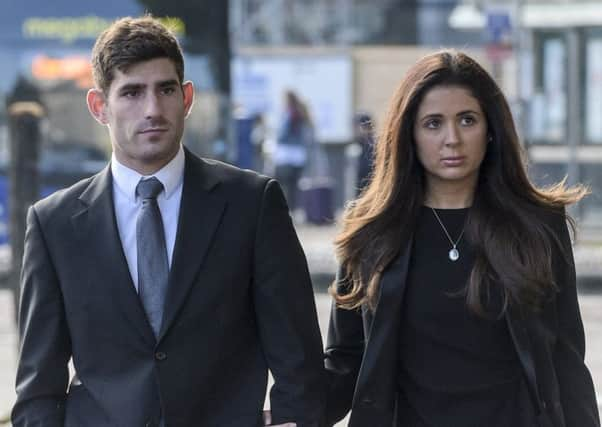Dani Garavelli: Why women shudder at Evans trial verdict


The outpouring of vitriol towards the woman at the centre of the case – the demands for her to be arrested, thrown in prison, “raped for real” for her “lies” – were not only a distortion of the jury’s position on her reliability, but an insight into the hatred of women that flourishes in the darkest corners of society.
Some of those men blame her for “ruining” the striker’s career at Sheffield United, though, she is the one whose life has been systematically destroyed. While Evans is already back playing, this time at Chesterfield, her reputation has been trashed. Illegally identified on Twitter by Evans’ supporters, she had to assume a new identity for her own protection.
Advertisement
Hide AdAdvertisement
Hide AdDespite his solicitor’s statement, Evans’ acquittal does not mean his “innocence has been established”, merely that his guilt was not proven “beyond all reasonable doubt”. And the accepted facts of the case demonstrate that – though he committed no crime – his behaviour was contemptible. In court, he admitted going to the hotel where his friend and the woman were having sex, lying to secure the key-card to the room, joining in the sex and then sneaking out the fire escape. Yet she’s the one being called a “slut”, a “bitch” and a “whore”.
Of course, we know fame fosters a sense of entitlement; it allows the Jimmy Saviles of this world to abuse in plain sight; and Donald Trump to proclaim “when you’re a star, they let you do anything”. We also know that women who make accusations of sexual assault tend to have the odds stacked against them.
It was fitting that the closing stages of Evans’ retrial should have followed the C4 drama National Treasure’s powerful depiction of the trauma victims face in court. In the fictional series – inspired by the Operation Yewtree inquiry – one complainant is asked about her physical maturity, and minor anomalies in testimony and behaviour are used to undermine credibility.
Shockingly, back in the real world, Evans’ defence was also given permission to use details of his accuser’s sexual activity against her; so the court was told that shortly before, and two weeks after the alleged rape, she had sex with two men (one on each occasion); this evidence was allowed, in the knowledge juries are less likely to believe “unchaste” women.
Such disclosure is not the default position. Section 41 of the Youth and Criminal Evidence Act 1999 restricts the evidence about an alleged victim’s sexual behaviour that can be put before the court. It was introduced because consensual sex with one man – or indeed half a dozen – has no bearing on a woman’s right to say no to other encounters.
But the legislation states an exception can be made if the sexual activity involved took place “at or about the same time” as the alleged offence, and is so similar to the activity involved in the alleged offence that it could not “reasonably be explained as a coincidence”.
In the Evans case, the men were allowed to tell the court that, on the occasions they had sex with her, the woman had favoured a particular position, and urged them to “go harder”. This was considered important because it tallied with Evans’ version of events on the night in question.
Perhaps this seems fair enough. But to understand the outrage it has caused, you have to look at the way the Evans campaign was waged. After he was released from jail in 2014, his supporters ploughed large sums of money into hiring a new legal team to overturn his conviction. A private investigator was brought in to look into the woman’s past and – at one point – a £50,000 reward was offered to anyone who came forward with information that would lead to his acquittal.
Advertisement
Hide AdAdvertisement
Hide AdDuring the appeal hearing, the Crown suggested the two witnesses – who gave detailed new statements in early 2015 – might have been “fed” information by Evans’ side, but their claim was rejected and his conviction quashed. Then, during legal arguments at the retrial, Evans’ girlfriend, Natasha Massey, was accused of offering an “inducement” to a key witness. Again, the trial judge found in favour of the defence.
The jury’s decision to acquit was understandable. Even so, we are left with the sense that one defendant – by virtue of his profile and wealth – was able to secure a not guilty verdict where another man might not. And of a justice system which – for all its supposed improvements – still treats victims as second-class citizens.
Already, Vera Baird, barrister and Northumbria police and crime commissioner, has warned that the appeal court decision could set a precedent, with defence lawyers combing through women’s sexual histories. That, together with the online backlash, will surely have a negative impact on the number of women prepared to take a case to court.
We may look across the Atlantic and feel superior as Trump answers accusations of sexual assault by suggesting his accusers are too ugly to bother with. But the Evans case suggests we have nothing to be complacent about. He may have been cleared of any crime. But we too have a climate in which celebrities believe they live by different rules, and where women at the centre of sexual assault cases risk losing everything.